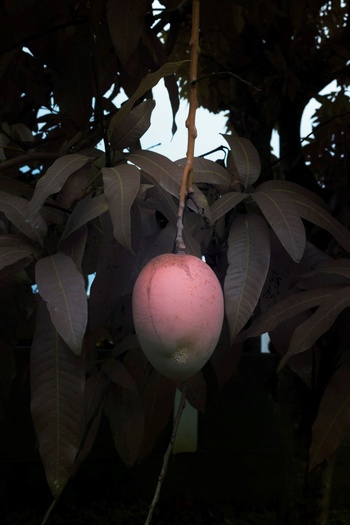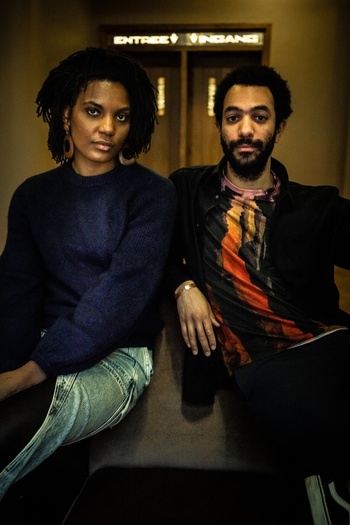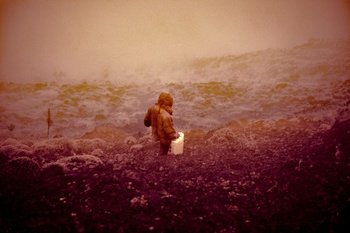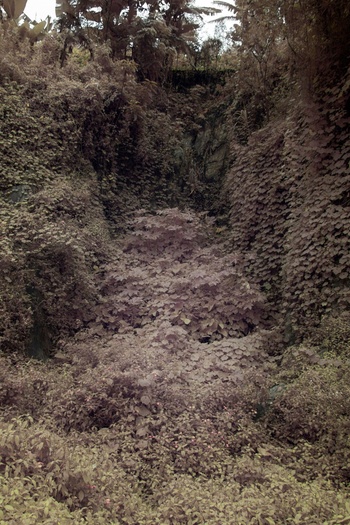The internationally renowned Belgian-Congolese photographer Léonard Pongo has finally been given a solo exhibition in one of his home cities: Brussels. In Bozar, “Primordial Earth”, curated by Sorana Munsya, takes the spectator on a dreamlike journey. It is like a rite of passage that signals the end of the single story of the Congo and replaces it with a multiplicity of narratives, both real and imagined.
More about Léonard Pongo and Sorana Munsya
Léonard Pongo
- Born in 1988 in Rocourt (BE).
- Holds a degree in political science (Maastricht University).
- 2011: goes to the DRC for the first time.
- The success of his first series The Uncanny leads to numerous publications and international exhibitions, such as IncarNations at Bozar.
- 2021: After being exhibited at the FOMU in Antwerp, and the Lubumbashi Biennale, and winning the Prix de l’OIF at the Rencontres de Bamako, his Primordial Earth series is now coming to Bozar.
Sorana Munsya
- Born in the Congo, grew up in Belgium
- Holds degrees in psychology (ULB) and political science (UCL)
- 2017: assistant curator of the 5th Lubumbashi Biennale of Contemporary Art
- Member of the editorial team of the art journal Afrikadaa and of the eponymous collective. Writes for many art catalogues and magazines
- Has collaborated with many different artists and institutions such as the Wiels, Bozar, the Middelheim Museum, Mu.ZEE, and the Dak’Art Biennale
The smoking crater of a volcano illuminating the night. A dugout canoe making its way through the middle of an ocean of vegetation. Birds swirling in a sky of silvery water. Wandering through “Primordial Earth” is like finding yourself in the story of the beginning of the world. Nature seethes. It erupts. The surface of the Earth, which has not yet cooled, is shrouded in a pinkish-orange atmosphere. It is a sumptuous spectacle.
The intensely allegorical imagery was drawn from the Democratic Republic of the Congo between 2017 and 2020, amid the majestic settings of Virunga National Park (North Kivu), in the enchanting Equatorial forest, and in natural sites in Kasaï, the province that Léonard Pongo's paternal family is from. His mother's family is from the Belgian Ardennes.

© Léonard Pongo The dreamlike imagery composed by Léonard Pongo seems to take on the same magical properties as the cosmogonies he explores.
The Brussels-and-Kinshasa-based photographer first went to explore the DRC ten years ago. He thought he was going there to cover tense presidential elections, along with journalists who had been sent specially from all over the world. The young man, who had just received his diploma in political science and who was trained in photography on the job, quickly realised that he had not come to the DRC to document a sensational story, but to explore his own personal and subjective relationship with the country, to get to know its inhabitants intimately in order to tell his own story.
“Being confronted with my family's opinions and vision made me change my approach,” explains Léonard Pongo. “My understanding of Congolese reality was based on stories that I had been told. As a Congolese person growing up outside of your country, you create representations for yourself and when you are confronted with the reality, some parts fit and others don't.”
The result was The Uncanny, a collection of dreams stolen from the night, shared moments with family and friends, incorporating the vast spectrum of human emotions. An entrancing black and white series in the tradition of, among others, the family of introspective photographers who first inspired his passion for photography: Michael Ackerman, Antoine d'Agata, Anders Petersen, among others.
As a Congolese person growing up outside of your country, you create representations for yourself and when you are confronted with the reality, some parts fit and others don’t.
The success of The Uncanny led to Léonard Pongo featuring in numerous publications and international exhibitions, such as “IncarNations” at Bozar, curated by Kendell Geers and the late Sindika Dokolo. In 2017, he was invited to take part in the Ateliers de la Pensée in Dakar, the major event of the reawakening African intellectual scene, started by Achille Mbembé and Felwine Sarr. The idea for a second project arose and took shape after the workshop. The DRC would no longer merely be the site of encounters between the photographer and his origins, but also of a confrontation with the Origin. Of the world and of humanity.
INSPIRED BY PAINTINGS
This time, Léonard Pongo abandons the grainy and contrasted black and white to embrace the softness of colour and to flirt with abstraction, fiction. The bustle of urban environments gives way to the poetry of natural zones, practically or entirely uninhabited. “At the moment, I am mainly inspired by painting and traditional crafts.”
After being exhibited at the FOMU in Antwerp, and the Biennale de Lubumbashi, and winning the Prix de l'OIF at the Rencontres de Bamako, the Primordial Earth series is coming to the Salle du Conseil in Bozar. It is Léonard Pongo's first solo exhibition in Brussels. The scenography, which combines printed photographs, textiles (veils and woven tapestry), and video installation, is the fruit of a dialogue between Léonard Pongo and Sorana Munsya, the Brussels-based independent curator and art critic who has collaborated with Wiels, Bozar, the Biennale de Lubumbashi, Dak'Art, and others.

© Sophie Soukias
| Photographer Léonard Pongo and curator Sorana Munsya: “We are offering people a sort of peregrination, a space in which you can lose yourself on a symbolic level.”
The result is an intensely sensory experience that honours the cosmogony that inspired the artist. “With the scenography, we are offering people a sort of peregrination, a space in which you can lose yourself on a symbolic level. Primordial Earth explores mythology, but it also explores the vision that we create for ourselves of the world,” says Sorana Munsya.
Immersed in an imaginary territory filled with the beauty of reality, spectators find themselves changing their point of view, welcoming new narratives. The Congo represented in Primordial Earth is not the Congo to which the history of Western photography has accustomed us. “Perception is conditioned by decades of representation,” says Sorana Munsya.
The imagery composed by Léonard Pongo does not speak of wars, or tensions, or misery. Nor does it seek to document a far-away land to discover the truth, nor to penetrate some mystery, which is too often associated with the African continent. The Congo is no longer the setting for exoticising photography intended to represent “the other”. It becomes the realm of a personal experience that is unafraid to assert its subjectivity.
What appeals to me about Léonard Pongo’s work is that there is doubt in it
“What appeals to me about Léonard Pongo's work is that there is doubt in it,” says Sorana Munsya. “In the Congo, he realised that it is important to respect your own experience and those of the places and people you are attempting to portray. Surrounded by nature, he realised that he was dealing with something bigger than himself and that he could not communicate that environment in its totality.”
Once again, the photographer tells the story of his encounter with an environment, rather than attempting to capture it. “When you come from the diaspora, your relationship with your country of origin is based on sensations. And it is through sensory experiences that you reconnect with that country, but also through knowledge,” says the curator, who was herself born in Congo but grew up in Belgium.

© Léonard Pongo "Environmentalism is not really the issue for people who have figured out how their environment functions"
“The environment that I present is a creation that results from the confrontation between my imagination and the territory, but also from a lot of reading,” explains Léonard Pongo. “It involved a lot of travelling; several weeks spent in the Equatorial forest, in the east of the country, and in other places that are important because of their flora and fauna, but also due to their art, their crafts and my personal connection. I am very inspired by the creations and tales originating from the Greater Kasaï region (in the south of the country, bordering Angola, Ed.). That is where my family comes from, so I heard Kasaï stories when I was growing up and I have an affinity with certain signs. You also find those symbols on craft objects, pieces traditionally created for royalty or the nobility.”
Particularly inspired by the cosmogony of the Luba ethnic group and the stories of the Lulua, Kuba, Songye, etc., the artist creates, through contact with nature, imagery of his own. “In several ethnic groups, we find the idea that the Earth is subdivided into several kingdoms: animal, plant, and human. With a form of hierarchy between the different spaces: the water, the forest, the savanna, etc.” Drawing on the ancestral myths of the Congo to create his own mythology, Léonard Pongo invites the viewer once again to change their point of view, to embrace creation myths other than the one that was imposed all over the world by the Crusades and other missionary campaigns.
THE BIRTHPLACE OF HUMANITY
In other words, "Primordial Earth" abolishes the hierarchy of narratives in order to shine light on new ones. Narratives about the formation of the world that originate in Africa, the birthplace of humanity. “I suggest that the Congo could be a source, if not ‘the’ source. The type of environment that I photograph makes it easy to imagine that that’s where life began,” says Léonard Pongo.
When I am taking a photograph, I try to represent that which we cannot really perceive with our senses
The exploration of new cosmogonies also urges us to reject another hierarchy: man’s total power over the plant and animal worlds. “I don’t know if we can call it ancestral environmentalism, but the people who live in the environments I photograph have a much more systemic relationship with nature. Environmentalism is not really the issue for people who have figured out how their environment functions.
There is a humility and respect for nature that are capable of surviving anything, a symbiosis that is necessary to survival,” says Léonard Pongo. “Primordial Earth is not about environmentalism, but it does question the global approach of environmental politics whereby, in their rush to repair what has been damaged, people forget to think locally, at the level of human beings,” says Sorana Munsya.
IN HARMONY WITH THE ELEMENTS
Léonard Pongo becomes acutely aware of that human level with every incursion into the most beautiful natural sites in the DRC. “You feel extremely small and you also feel like you’re in danger. These are environments in which you are very quickly directed by nature and where you are not in control,” says the photographer. “But it’s also an extremely good feeling, because you are in the hands of people who know how to read those environments.” In these majestic sites, Léonard Pongo feels at ease, in harmony with the elements. “I grew up with a mother from the Ardennes, so I find the forest extremely reassuring. When I am in these natural environments, I feel comforted.”

© Léonard Pongo “I grew up with a mother from the Ardennes, so I find the forest extremely reassuring.”
An intensely sensory experience that is also like an apprenticeship. “I don’t know the Equatorial forest, I don’t know the topography of the DRC. I don’t necessarily know how to navigate an arid landscape like the summit of Nyiragongo (a stratovolcano in the Virunga mountains, west of the border with Rwanda, Ed.),” says Léonard Pongo.
"When I am taking photographs, I am accompanied by people who know the flora and fauna and know how to read it, the names of certain animals, and how to identify their tracks. That helps me to understand why such mythologies were created in such an environment. In many stories, we find the idea that humans do not see all that exists, that some things have a double or a ghost.”
The dreamlike imagery composed by the artist seems to take on the same magical properties as the cosmogonies he explores. Trails are constantly obscured by a thick blanket of fog. A wondrous fruit shines like a diamond. The silhouettes of children escape the photographer’s gaze as they run through some tall grass. “When I am taking a photograph, I try to represent that which we cannot really perceive with our senses, which are limited. Not everything is accessible to humans. This idea deeply influenced the image creation process, which relies on visual techniques that record light outside of the spectrum visible to humans.”
In 2009, in a lecture that has since been viewed more than 25 million times on TED, the American media organization that posts influential talks online, the Nigerian writer Chimamanda Ngozi Adichie warned her audience of the danger of single stories and of the importance of not talking about Africa only in terms of catastrophes and misery, thus depriving African populations of their dignity. She ended her powerful speech: “When we reject the single story, when we realise that there is never a single story about any place, we regain a kind of paradise.”
LÉONARD PONGO: PRIMORDIAL EARTH
> 10/3, Bozar*, www.bozar.be
*Due to an incident the centre for fine arts and its exhibitions will be closed until january 27
Read more about: Expo
Fijn dat je wil reageren. Wie reageert, gaat akkoord met onze huisregels. Hoe reageren via Disqus? Een woordje uitleg.